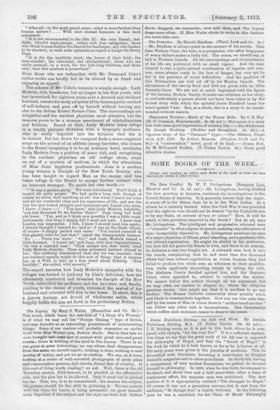SOME BOOKS OF THE WEEK.
[trader this heading we notice such nooks of the week as have not beta reamed for review in other forms.1 The Race Conflict. By W. P. Livingstone. (Sampson Low„ Marston and Co. 3s, 6d. net.)—Mr. Livingstone, having studied, the race question in Jamaica, continues his investigations in the United States of America. It is generally known that the negro.. is worse off in the States than he is in the West Indies. As a citizen he is unfairly treated. After the Civil War it was provided that the right to vote should not be denied "by the United States or by any State, on account of race or colour." How, it will be asked, is this provision observed in the South ? Not at all, says Mr. Livingstone. The intelligent and progressive coloured mater —" coloured " is often a figure of speech, meaning only admixture of race—is especially objected to. Mr. Livingstone mentions the case of a negro physician of fifteen years' standing, and a graduate, who, was refused registration. He might be skilful in his profession, but that did not prove his fitness to vote, and there is no remedy_ In Alabama a case was fought out. A coloured man took it into. the courts, complaining that be and more than five thousand others had been refused registration as voters because they had failed to produce two white men as witnesses to their qualifica- tion, white applicants succeeding simply by taking the oath.. The Alabama Courts decided against him, and the Supremo Court, when appealed to, refused to entertain the matter. We cannot follow the author through all his argument, but we may refer our readers to chapter ix., where the religious question occurs. One might say that it is needless to go any further. The Roman Catholic community alone permits white and black to communicate together. How any one who calls him. self by the name of Him in whom there is " neither bond nor free can follow any other rule is inconceivable. The Christianity which suffers such exclusion ceases to deserve the name.










































 Previous page
Previous page